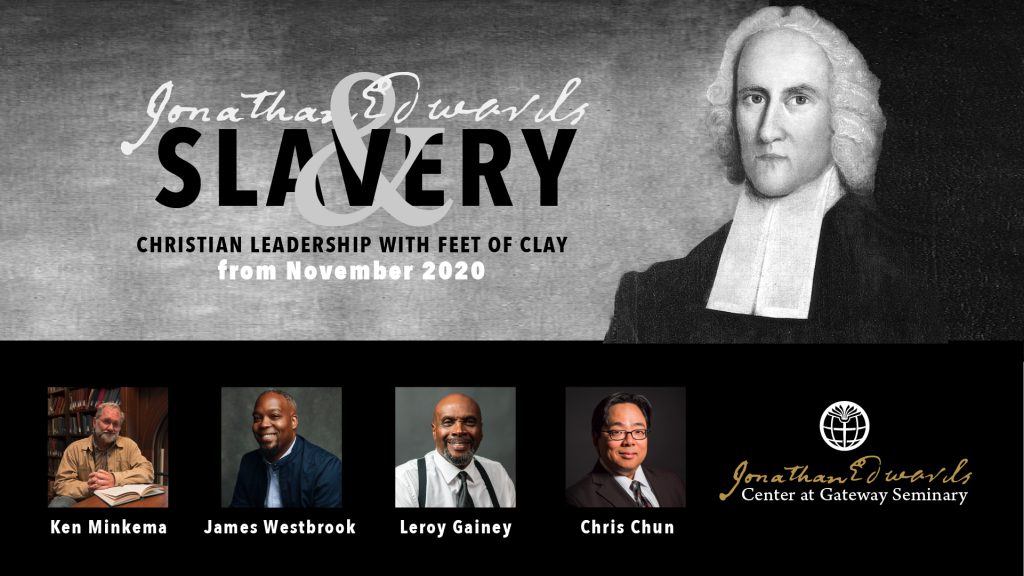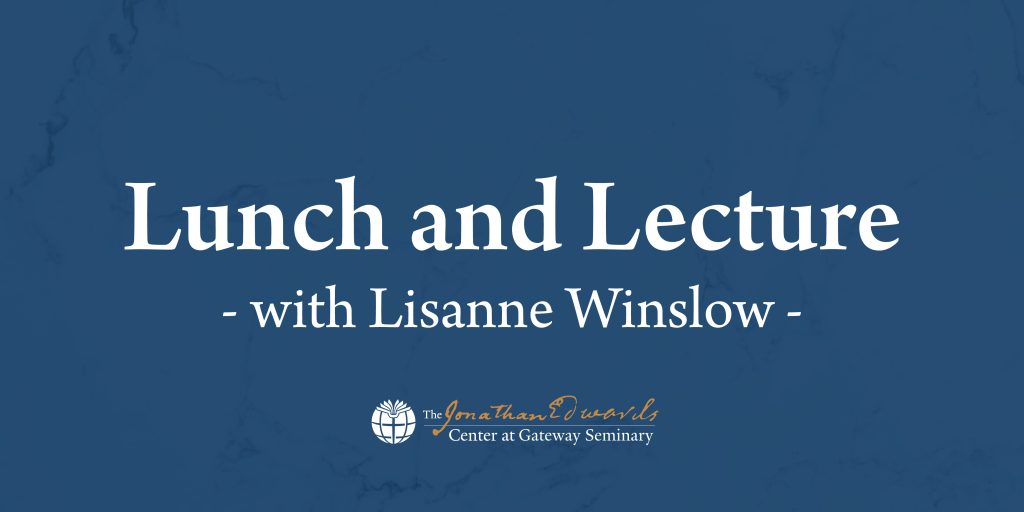The year 2020 was not only marked by sheltering-in-place and social distancing but also the civil unrest following George Floyd’s death, which permeated every facet of our lives. In this political climate, Jonathan Edwards (1703 – 1758) continues to be targeted on various social media platforms for his complicity in institutional slavery. In response to indiscriminate cancel culture, the Jonathan Edwards Center (JEC) at Gateway Seminary hosted a virtual event on November 2, 2020, with the theme of “Jonathan Edwards and Slavery: Christian Leadership with Feet of Clay.” In a ‘news-interview’ style, I moderated three speakers: Ken Minkema, pastor James Westbrook, and Dr. Leroy Gainey.

Dr. Minkema is the director of the JEC at Yale University and is the foremost expert on this historical question. James Westbrook is a former Gateway student who took my Edwards class several years ago, and he had some keen insights on this issue. He spoke on how he came to appreciate Edwards. Dr. Gainey is senior professor of educational leadership at Gateway and is the first trustee-elected African American professor in SBC history. He addressed the broader subject of how modern readers can think about a Christian leader’s legacy who lived and died before the abolitionist movement in the 1830s. For 90 minutes, the panel examined the issue of slavery in the early American period and assessed how modern readers ought to interact with Edwards’ position.
I received positive feedback from people who joined us by watching the panel discussion. President Iorg thought it was outstanding and was particularly impressed with the panel’s discussion on cancel culture. He added, “Good words on a difficult subject!” JEC board member and professor at Southwestern Seminary Rob Caldwell said, “Each of the presenters offered very helpful perspectives on how we are to appreciate Edwards in the wake of the racial unrest this year. It is so important that nuanced, complex answers are available out there on this topic. The simplistic, emotive reactions of cancel culture are not constructive; this discussion was.” The panel’s consensus indicated we can still appreciate Edwards within his historical context without justifying his complicity in the institution of slavery. I ended our discussion by asking the following question to the audience: “Every generation has their own mistakes, but our mistakes are different from theirs. If Edwards, a godly person who loved scripture, who authored The Nature of True Virtue and Religious Affections, was so blind to the great sin of his generation, how about us? How about those of us living in the twenty-first century?”
Watch the full digital panel
Event

Register for a free lunch and lecture with Lisanne Winslow on March 31, 2022, at 12 p.m. at Gateway Seminary. Dr. Winslow is a professor of biology at the University of Northwestern, St. Paul. Having earned doctoral degrees in both theology and biology, Winslow’s research interests integrate the two disciplines.
Dr. Winslow will be presenting themes from her recently published books:
A Great and Remarkable Analogy: Jonathan Edwards’ Onto-Typology of Nature (Yale University Jonathan Edwards Center, “New Directions in Edwards Series” published through Vandenhoek and Ruprecht Publishers), and A Trinitarian Theology of Nature (The Princeton Theological Monograph Series, with a Foreword by Alister McGrath, Director of the Science and Religion at the University of Oxford).
Read More

Reflections on the Bible Teaching Conference
Hear from attendees what they learned at the Bible Teaching Conference.

Hope in Suffering
Gateway student Matt Bodden is an evangelist who is ready to answer the question of suffering with the gospel.
Listen
Prophets | Haggai
The boys are back. And by boys we mean the Israelites. The people have returned to their land and after rebuilding their homes and the city walls, God pushed them to finally rebuild His temple. While probably not the most read book in the Bible, Haggai still contains

Prophets | Daniel Part 2
Now with the historical portion of Daniel done, Dr. Wegner takes us through the visions of beasts and years. All these figures intending to show us something. What does it all tell us about God?

Watch

Jonathan Edwards and the Asbury Revival
Chris Chun and Chris Woznicki discuss the signs of true revival, signs of the work of the Holy Spirit, and why it is important to critically assess the characteristics of revival in a spirit of charity.

Jonathan Edwards and the Baptists | Douglas Sweeney, Nathan Finn and Chris Chun
Dr. Douglas Sweeney and Dr. Nathan Finn joined Dr. Chris Chun for a panel discussion on Jonathan Edwards, recorded live at the SBC Annual Meeting in Anaheim.



